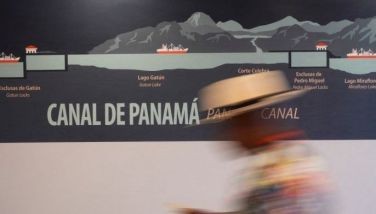PNOC-AFC sets sights on Europe’s biodiesel market
April 2, 2007 | 12:00am
PNOC-Alternative Fuels Corp. is exploring possible business opportunities in the European biodiesel market, a top company official said.
PNOC-AFC chairman Renato S. Velasco, who attended the recent World Biofuels Markets Conference in Brussels, said Europe could be a potential partner of the Philippines in the development of alternative fuels.
"We will produce biofuels primarily for the Philippines. We have talked to a number of oil majors who want to be offtakers of PNOC-AFC. If and when we have excess supply, we intend to ship them to the United States, China and most specially Europe," Velasco said.
Velasco noted that the global biodiesel industry, led by the European Union, is fully developed and in full swing.
"They have agreed on a 10 percent mandated biodiesel blend by 2020 and 20 percent renewable energy contribution in their energy mix. The agreed target by 2010 is a 5.75 percent biodiesel blend. Their vision of a sustainable energy future is much lauded," Velasco added.
PNOC-AFC president and CEO Peter Anthony Abaya echoed Velasco’s optimism.
"This is where we see a huge opportunity for the Philippines and the PNOC-AFC looming. The European demand will be there. The US and Chinese demand is expected to be very strong. These are the largest consumers of biofuels in the world. If the world moves towards a mandated 10 percent blend just like Europe, we may be looking at an annual global demand of about 200 million MT," Abaya said.
Abaya said he sees bright prospects for the biofuels industry in the country. "This goes to show that the biofuel age has arrived. Biodiesel and other biofuels work well in engines. They are widely used all over the globe, and is becoming a primary contributor in the energy mix of most western countries," he said.
Using biodiesel, Abaya said, has become very popular all over the world. "We have seen vehicles that run on 100 percent biodiesel. A high-speed sea craft is about to traverse the earth running also on 100 percent biodiesel," he said.
"The demand is surging globally. Opportunities for the PNOC-AFC lie in providing a small part of that supply. We will be competitive with the prospects of high quality biodiesel with the lowest production cost in the region," he said.
According to Abaya, demand for biodiesel in Europe today already surpasses supply.
"Their present biofuel crops (rapeseed and soy) have competing food applications. This gap is expected to widen very quickly towards 2010 and more towards 2020," he said.
He said the key to success lies in PNOC-AFC successfully integrating its plantations and refineries. "This is to keep transfer prices out of the equation leading to lower cost biodiesel. Secondly, we must be aware that feedstock prices must remain low. Thus land and labor costs must be in check."
PNOC-AFC chairman Renato S. Velasco, who attended the recent World Biofuels Markets Conference in Brussels, said Europe could be a potential partner of the Philippines in the development of alternative fuels.
"We will produce biofuels primarily for the Philippines. We have talked to a number of oil majors who want to be offtakers of PNOC-AFC. If and when we have excess supply, we intend to ship them to the United States, China and most specially Europe," Velasco said.
Velasco noted that the global biodiesel industry, led by the European Union, is fully developed and in full swing.
"They have agreed on a 10 percent mandated biodiesel blend by 2020 and 20 percent renewable energy contribution in their energy mix. The agreed target by 2010 is a 5.75 percent biodiesel blend. Their vision of a sustainable energy future is much lauded," Velasco added.
PNOC-AFC president and CEO Peter Anthony Abaya echoed Velasco’s optimism.
"This is where we see a huge opportunity for the Philippines and the PNOC-AFC looming. The European demand will be there. The US and Chinese demand is expected to be very strong. These are the largest consumers of biofuels in the world. If the world moves towards a mandated 10 percent blend just like Europe, we may be looking at an annual global demand of about 200 million MT," Abaya said.
Abaya said he sees bright prospects for the biofuels industry in the country. "This goes to show that the biofuel age has arrived. Biodiesel and other biofuels work well in engines. They are widely used all over the globe, and is becoming a primary contributor in the energy mix of most western countries," he said.
Using biodiesel, Abaya said, has become very popular all over the world. "We have seen vehicles that run on 100 percent biodiesel. A high-speed sea craft is about to traverse the earth running also on 100 percent biodiesel," he said.
"The demand is surging globally. Opportunities for the PNOC-AFC lie in providing a small part of that supply. We will be competitive with the prospects of high quality biodiesel with the lowest production cost in the region," he said.
According to Abaya, demand for biodiesel in Europe today already surpasses supply.
"Their present biofuel crops (rapeseed and soy) have competing food applications. This gap is expected to widen very quickly towards 2010 and more towards 2020," he said.
He said the key to success lies in PNOC-AFC successfully integrating its plantations and refineries. "This is to keep transfer prices out of the equation leading to lower cost biodiesel. Secondly, we must be aware that feedstock prices must remain low. Thus land and labor costs must be in check."
BrandSpace Articles
<
>
- Latest
- Trending
Trending
Latest
Trending
Latest
Recommended



























